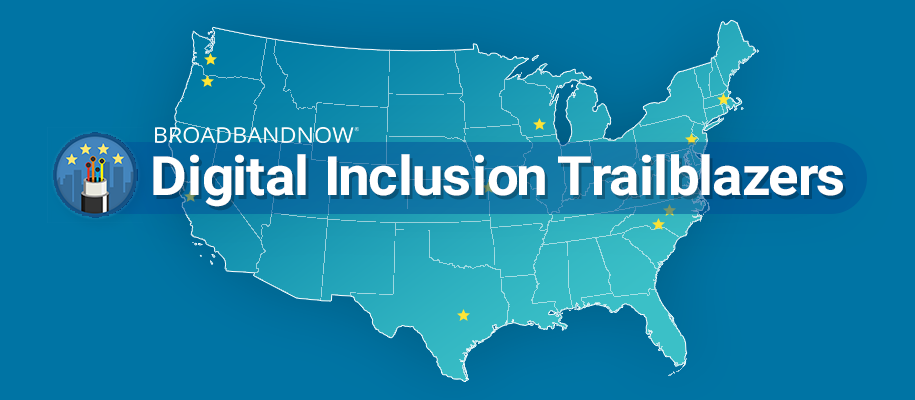BroadbandNow Publishes List of Top 10 Trailblazers for Digital Inclusion
Ten cities have been recognized this year as Digital Inclusion Trailblazers, Tyler Cooper from BroadbandNow reports. 21 million Americans still lack access to a broadband-level internet connection, and roughly 146 million people do not have access to a low-priced plan for residential wired broadband

Ten cities have been recognized this year as Digital Inclusion Trailblazers, Tyler Cooper from BroadbandNow reports. 21 million Americans still lack access to a broadband-level internet connection, and roughly 146 million people do not have access to a low-priced plan for residential wired broadband. These cities are leading the way in bringing unprecedented levels of broadband access and awareness to their residents.
Portland, Oregon: With its reputation for being a progressive metropolis committed to the working lifestyles of the future, 98 percent of Portland residents have access to multiple broadband internet connections and 79 percent have access to fiber.
In 2014, the city’s community established the Digital Inclusion Network, a coalition aimed at “raising awareness about digital equity barriers and developing solutions to bridging the digital divide.” In 2018, Mayor Ted Wheeler instituted a city-wide Digital Inclusion Week.
Austin, Texas: 99 percent of Austin residents currently have access to multiple broadband connections. The city’s Unlocking The Connection program helps bring free broadband internet access to low-income communities in partnership with Google Fiber, as well as provide refurbished computers and digital literacy courses.
The city’s Grant For Technology Opportunities Program also provides financial assistance for upgrading computer labs and improving free, basic web access for all residents.
Seattle, Washington: Seattle’s Technology Matching Fund has helped more than 43,000 residents create resumes, use email services, and take digital literacy courses for the first time. The city is actively engaged in outreach projects such as East African Community Services and Helping Link programs, both of which were awarded grants to replace aging computer infrastructure and provide digital literacy courses to minority communities around Seattle.
Raleigh, North Carolina: While not as widely known for its tech economy as some of the other cities on this list, Raleigh’s local government has been doing excellent work fostering connectivity and inclusion for nearly a decade. Since 2011, Raleigh’s Raleigh Digital Connectors program and its 163 members have taught computer skills to 3,376 individuals and refurbished 892 computers over the past several years.
Bradley Upchurch, the Digital Inclusion Manager at the Raleigh Housing and Neighborhoods Department said that the Digital Connecters program has been instrumental in helping to bridge the digital divide in the city.
Charlotte, North Carolina: Charlotte’s tech scene is growing rapidly, and the city is making a concerted effort to ensure that all its residents can reap the benefits. The goal of the Charlotte Digital Inclusion Alliance is to reduce the digital divide by digital literacy courses, funding opportunities, and other resources for the community to take advantage of.
Boston, Massachusetts: Boston has long been a champion for digital inclusion, helping to establish the Tech Goes Home program back in 2000. The program has trained more than 30,000 people and distributed more than 20,000 new computers to graduates, 80 percent of which have household incomes lower than $35,000 per year.
In 2017, Boston allocated $35,000 in grants to local organizations aimed at bridging the digital divide. New initiatives such as the Digital Equity Fund are working to ensure that all residents have the means and skill sets necessary to thrive in a digital economy.
Philadelphia, Pennsylvania: The city of Philadelphia recognizes that robust connectivity is key to a healthy populace, and this is especially evident when looking at the work they’ve done to foster access within city limits. The city’s KEYSPOT program has established more than 50 dedicated public access centers, providing digital literacy courses and high-speed broadband to more than 80,000 residents every year.
San Jose, California: Already one of the best-connected cities in the U.S, San Jose’s local government has adopted a creative solution to completely bridge their digital divide. Earlier this year, Mayor Sam Liccardo announced the Digital Inclusion Fund, which will help tax wireless providers like AT&T and Verizon deploy broadband and install 5G small cells.
The fund will also provide grants to local organizations seeking to offer digital equity education and resources.
Kansas City, Missouri: Kansas City’s Digital Inclusion Fund aims to provide resources and training to “support local projects that provide computer access; make it easy to get online; help make the internet relevant, exciting, and beneficial for new users; and increase people’s digital skills.“
Additionally, organizations like the Kansas City Coalition for Digital Inclusion and Connecting For Good are dedicated local advocacy groups that help low-income residents find free Wi-Fi and computers, as well as offer additional digital literacy training within the city limits.
Madison, Wisconsin: One of the lesser known but rapidly growing tech hubs, Madison is quickly making a name for itself as being a champion for all its residents’ right to access the internet. The city is currently partnering with CTC Technology and Energy to design and implement a citywide fiber network.
Additionally, organizations like Everyone On Madison and DANEnet are centered around providing access to IT services and general computer literacy courses in the city.








Member discussion